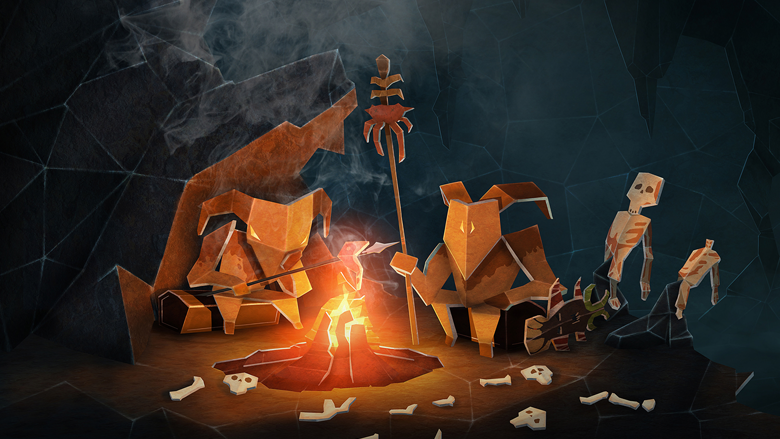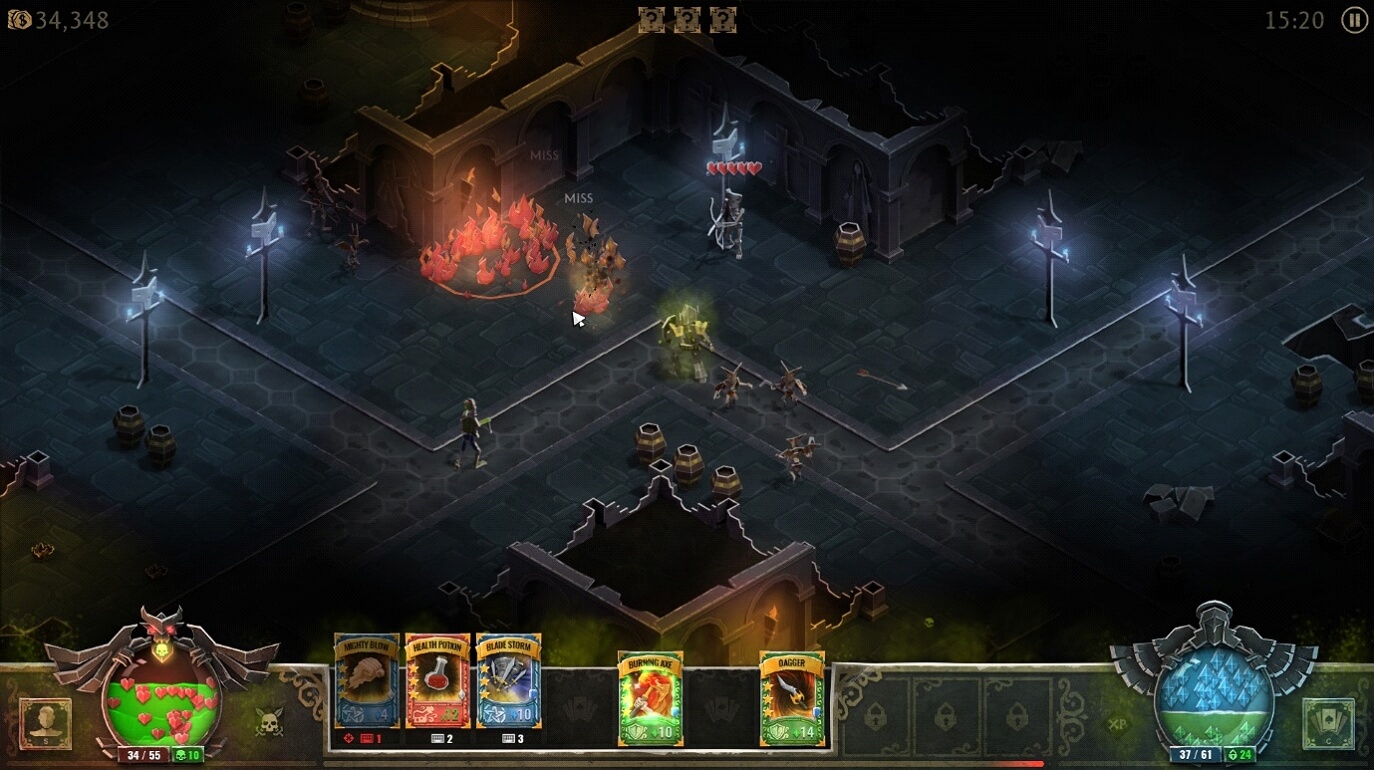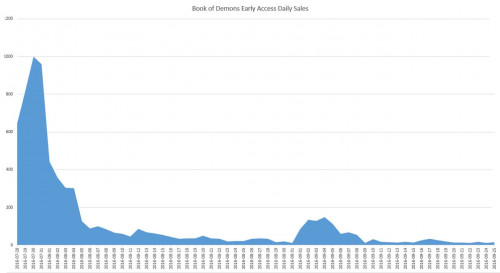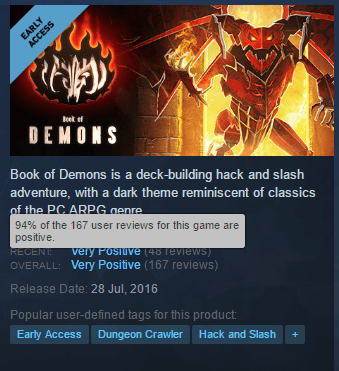Maciej Biedrzycki, co-founder, producer and programmer of the Polish studio Thing Trunk, told about why it is so difficult to launch if you are not an AAA title and how the “Early Launch” affects sales using the example of the Book of Demons game.
It seems like it was only yesterday, but in fact it’s been two months since Book of Demons went into Early Access. Almost the entire Thing Trunk team had quite a serious experience in game development before, and yet for each of us it was the first launch in “Early Access”. So, how did it go and did we learn anything? Get ready to find out about it in all the positive and not very details.
Game
For those who haven’t heard of Book of Demons, it’s a slasher in a dark fantasy setting. The game takes place in the Paperverse universe – a clamshell book. The game has a lot of both old and new. On the one hand, this is a sentimental journey in the 90s to the origins of PC gaming (one might say, a tribute to the memory of the first Diablo). On the other hand, it is an attempt to breathe new life into the genre of slashers. The game has many unexpected twists and deviations from the standard RPG mechanics. For example, a card system that equalizes charms, skills and items, or very different from the usual movements of characters and rules of battle.
Goals and expectations
Since this was our first launch into Early Access, we didn’t know what to expect. The whole team was very nervous because we had been making the game for more than 3 years.
We didn’t have a publisher, so all the marketing and financial risk fell on our shoulders. As you can probably imagine, it was quite exciting.
To recapture the costs, we need to sell 35 thousand copies. But, of course, we are counting on more – to sponsor work on future projects (Book of Demons is the first game in the Return 2 series). In theory, it is quite simple to sell such a quantity. After all, slashers are a very popular genre, and projects like Grim Dawn, Torchlight, Path of Exile, Van Helsing sell hundreds of thousands, if not millions of copies. A little bit of luck, a game that appeals to the same audience – and we will also achieve the same success, right?
But reality was already preparing to prove to us that everything is not so simple.
How to raise a HYIP
We understood that the times when good games didn’t need marketing were long in the past. Therefore, we started promoting the game 9 months before we launched it in Early Access. Many of you probably immediately thought that we were late. And you’re probably right. But the fact is that with such a small team as ours (now there are 7 of us), promoting the game means removing someone from the team to the detriment of the project. I’m writing this post right now, but I feel like I should be adding something to the game.
For 9 months, we did everything according to the textbook.
What can I remember offhand: we made several trailers and teasers, regularly released press releases about major events, gave several interviews, launched a high-quality website where we kept developer diaries. We made a press kit, a cover letter, and communicated with our small community on social networks. We posted screenshots, wallpapers and news about development on Reddit, N4G, IndieDB and Gamasutra. We launched the Sneak-Peek program for those who wanted to test the game before the end of development. We even took part in several shows – and as a result received a couple of cool awards.
It may seem that we have done a lot of things – and it really is, especially when viewed from the point of view of the efforts expended. But the truth is, it wasn’t much use. Yes, we managed to achieve some kind of press coverage, and even appear on several well-known resources like Rock Paper Shotgun or GameInformer. But there was no feeling that more people learned about the game from this (at least we did not see a strong increase in site visits).
Obviously, in the field of marketing, we could not compare with AAA projects, but at least we tried to do the most basic. And the launch did not come as a complete surprise to users. Perhaps if we invested more in marketing, there would be more hype around the game. But we’ll never know.
Zero day
Before moving on to the numbers, I want to quickly tell you what we did to promote the game immediately after and during the launch. This is our biggest and most significant event at the moment, so we have worked hard to do everything right. We even hired a full-time PR specialist, Tom, to unload the team (up to this point, we spent time on marketing in between development, and outsourced sending letters to the gaming press).
The goal was simple – during the early launch to attract as much attention as possible to our game on the Internet.
The most stressful was the last month before the launch, because we tried to attract the attention of the press and get video bloggers to want to talk about our game on the day of release. We sent hundreds of access codes (almost 400), and even though we knew that not every one of them would entail a review, we hoped that at least someone big would be interested in us.
Gamespot has released an exclusive video review. The Escapist in a short article told about our series and told about our manifesto. We were featured in Rock, Paper, Shotgun and mentioned in PC Gamer. In addition, there was a lot of talk about us on indie resources. Letsplays with our projects were released by popular bloggers – Cryaotic (more than 100 thousand views!), quill18 and ZackScott.
I will not go into the rest of the standard details, such as posting news about the game on social networks (we had a small budget of $500 for paid ads), on forums or on Reddit. I can only say that we used absolutely all the channels that we could think of, and at the same time I’m sure that we missed a couple after all. The Internet is a very large space, after all. Anyway, we were picked up in a lot of places, which was just fine. But it was a drop in the bucket compared to how AAA giants cover their titles in the media, or even compared to the noise the press makes around some indie projects (remember No Man’s Sky?).
Numbers
We launched on July 28, 2016 on three platforms: on Steam, in the Humble store and on our own website (where the Humble widget was screwed). To date, we have collected data from two months of sales. The graph contains data from all three distribution channels, but, as you understand, Steam was the main sales engine.
As you can see, we have sold almost 7,500 copies in less than two months.
For those who have published the game through a large crowded channel, the schedule should look familiar. When the game first launched, sales skyrocketed as the project attracted a lot of attention. This happened for several reasons:
- the game is new, so it was talked about in the press and on YouTube;
- the project was featured in the store (on the first page on Steam and in Humble);
- during the week, the game was sold with a 25% discount.
But as soon as the launch was over, and the press was busy with other projects, sales immediately fell. As can be seen from these figures, we did not manage to hold on to the top. Our attempts to stimulate sales led to a slight increase in sales (a jump in sales in the second half of the schedule – participation in the Pax program plus another 25% discount), but the effect of them did not last long.
What now?
Of course, with such sales rates, we will not reach our goals soon. But we are not going to give up :) From the excellent analytical articles by Sergey Galenkin, I concluded that our results for the game in early access are above average. In addition, games that were launched after “Early Access” usually sell better than those who did not go through this period.
Plus, we are still making efforts to promote the game. We will try to increase sales with new events and major updates. In the first such update, we will launch new features for the final stage of the game and a free demo version (around October). In November, a new class will appear – magicians, and in December – robbers. In addition, we are working on an Xbox version.
Another positive point is that the players like the project.
Book of Demons has 94% positive reviews on Steam (even with the latest changes), and we are doing everything we can to make users happy with the game. We have a lot of players who have played other slashers before, and most of them really like Book of Demons. We even have some real fans! So it all comes down to bringing our project to the right audience. We hope that when we finish the game at the beginning of next year, we will succeed.
Have we made a mistake somewhere?
One way to promote the game is to make a good project and then work hard to increase sales. But at some point we started to wonder if we were doing something wrong. Take the same No Man’s Sky. They sold millions of copies, even though the game itself was widely criticized by gamers and the press after its release. So if, from a financial point of view, it is more correct to promise mountains of gold and not fulfill promises, you involuntarily begin to wonder where our industry is moving. the saddest thing, in my opinion, is that the press never stopped talking about the game even after it came out and everyone saw that the project had nothing to do with the promised one.
Conclusion
Perhaps the conclusion should be made as follows: if the information about the game has not started to spread by itself, or if you do not want to deceive the press, then get ready to optimize and increase sales for a long time and hard. This is exactly what we are doing now, and we hope that our efforts will eventually pay off. So far, our sales are not particularly high, but current expenses are covered, and thanks to “Early Access” we will refine the game without a strong limitation in funds. Not to mention that we will have more opportunities to bring the game to perfection and make users happy.
And no matter what, we wouldn’t swap places with No Man’s Sky, because their tactics are very short-sighted.
Source: BlogThing Trunk




